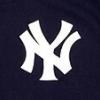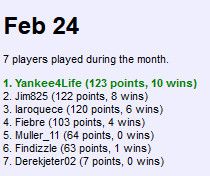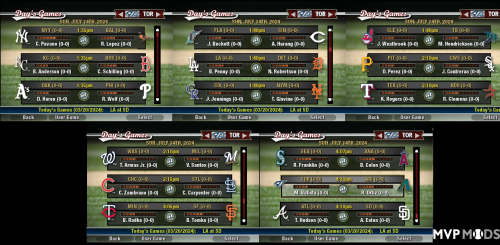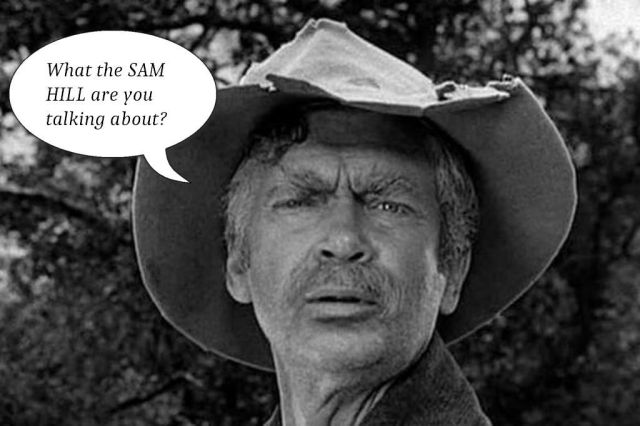-
Posts
21585 -
Joined
-
Days Won
82
Content Type
Profiles
Forums
Downloads
Everything posted by Yankee4Life
-
10 out of 10, 52 seconds. No, I don't know what happened. The questions were not challenging. i just didn't get into the right groove today. But you were in a good groove. Fantastic time today and that should win it for today. It's hard to beat that time.
-
6 out of 10, 104 seconds. I had some tough ones that I hope no one else gets like how many home runs did Dave Stapleton have in Pawtucket between 1977 and 1980? The correct answer was thirty which proves you learn something useless every single day.
-
10 out of 10, 32 seconds. As Jim said how you finish the month is more important than how you begin it. Stay close in the beginning and then try to make the good scores, especially with the easy baseball ones, at the end. No one runs away with this. Here is last month's final standings.
-
Jim, at first I thought you were kidding me so I sent out an email to the people who are in charge of this monthly contest and believe it or not you are not making this up. All points I collected this week are now erased from existence. 😮
-
3 out of 10, 167 seconds. Thank God they had mercy on me to ask me two baseball questions.
-
6 out of 10, 106 seconds. A struggle all the way today.
-
3 out of 10, 204 seconds. Don't ask me what happened because I am cheering over here that I got three right.
-
-
6 out of 10, 65 seconds. Some difficult ones today and I was fortunate enough to get six.
-
I am going to make a few announcements in the shout box this week asking for more players.
-
Jim, we both should have had a perfect score. This is going to be one tough rest of the week.
-
9 out of 10, 43 seconds. I did not have a good rhythm going today and I missed one that I should have known practically blindfolded. Now you might say to me what was I thinking because this answer is easy but there is a question where William McKinley was the right answer and because I didn't read all of it I guessed wrong. I am surprised I can type now because I am still kicking myself. 😄
-
10 out of 10, 66 seconds. Luckily the questions that were asked I was able to eliminate two choices on every one of them. I know how that's like because I had that happen to me not too long ago.
-
I don't think those questions were exactly easy. I know that I would have missed them too.
-
Really, it is. When Fridays roll around I always expect you and everyone else to get them all right.
-

Editing Rosters through REDitor: A Research Thread
Yankee4Life replied to Kccitystar's topic in Mod Research
I will be paying attention and rooting you on at the same time! -

Editing Rosters through REDitor: A Research Thread
Yankee4Life replied to Kccitystar's topic in Mod Research
-
10 out of 10, 38 seconds. After lousy days two out of the last three days I really needed this.
-
If I had your questions Jim I'd still get them wrong. 😃
-
Mel Ott Mel Ott’s life is a classic rags-to-riches story of a naive, unheralded, teenager from a small Southern town who rose to great heights in New York, the country’s largest and most forbidding city at the time. His baseball career could not happen today; no team could carry an inexperienced 17-year-old on a major league roster as an apprentice instead of sending him out for minor-league seasoning. It is also highly unlikely that such a diamond in the rough would be paid a minimal bonus and salary and, in today’s season-by-season money grab, that such a superstar would remain with his original team for 22 years. Despite his short, stocky build, Mel was a gifted athlete in all sports. Mel’s high school team played two games a week. On other days he excelled as the lefthand-hitting catcher for a semi-pro team. It was a local custom to pass the hat when a player’s home run figured in a victory. Mel Ott was earning money with his bat at the age of 14. He was turned down as “too small” by the New Orleans Pelicans of the Southern Association, so 16-year-old Mel joined a lumber company’s semi-pro team in Patterson, Louisiana, about 90 miles from New Orleans. He was an immediate sensation. A few months later the owner of the company, millionaire Harry Williams, stopped in New York on his way to Europe and recommended that Giants manager John McGraw give the youngster a tryout. Mel did not take seriously Williams’s postcard instructing him to report to McGraw. An annoyed Williams, on his return home in August, bought the teenager a train ticket to New York. The frightened youngster reported to McGraw for a tryout in early September 1925, impressing onlookers mightily on his first turn at practice. Giants’ second baseman Frankie Frisch recalled: “Mel stepped into the first few pitches and smashed them solidly through the infield. Then he hit several deep into the outfield, and finally he parked a number of fastballs and curves high against the advertising signs on the right field wall.” Later, with the sturdy little fellow out of earshot, an enthusiastic McGraw told a writer, “That kid is remarkable. He’s like a golfer; his body moves [including the distinctive cocked right leg action just before the pitch], but he keeps his head still with his eyes fixed on the ball. He’s got the most natural swing I’ve seen in years.” Then McGraw added, prophetically, “This lad is going to be one of the greatest lefthand hitters the National League has seen.” After the young Louisianan’s eye-opening hitting, McGraw kept him with the Giants, but out of the public eye. McGraw gave Mel a $400 bonus and a contract in January 1926. During spring training, McGraw told the still-growing 5-foot-7-inch, 150-pounder that he was too small to be a catcher, so he would be tutored as an outfielder. Every batting technique, every outfielding trick, and every fine point were provided by McGraw himself, star right fielder Ross “Pep” Youngs, left fielder Emil “Irish” Meusel and coach Roger Bresnahan. Bernie Wefers, a respected track coach, schooled the young man in running properly to avoid charley horses and knotted leg muscles to which the still-growing Ott was susceptible. McGraw had decided to keep his young prodigy rather than farm him out to be ruined by a minor league manager. And so Mel was brought along slowly, spending the next two years as a part-time player and, when he was not in the game, sitting uncomfortably on the bench listening to the profane McGraw’s intimidating lectures. After Ross Youngs died at 30 from a kidney disease in October 1927, Ott took over as the Giants’ regular right fielder at 19 in 1928. I929 was Mel’s breakthrough season. He had career highs in doubles, home runs, RBIs, runs scored and slugging percentage. His 42 homers and 151 RBIs are the most ever for players who were 20 or younger when the season began. Mel proved that he was a great hitter on the road as well at the Polo Grounds; he set still-existing National League away-from-home records for runs scored (79) and RBI (87). Moreover, he hit more home runs on the road (22) than he hit in the Polo Grounds with its short, 257-foot right field line. In addition to his emergence as a great hitter, Ott gained recognition as a premier right fielder. Expertly playing caroms off the tricky right field wall at the Polo Grounds, he had an impressive 26 outfield assists. He never again attained so many, because baserunners learned to advance very cautiously on balls hit to the rifle-armed Ott. Ott played at the same high level during the 1930 through 1932 seasons, but the club could not produce another pennant for the physically and emotionally exhausted John McGraw. First baseman Bill Terry replaced McGraw as the Giants’ manager on June 3, 1932. But the club was unable to climb out of the second division despite powerful hitting by Terry and Ott, who tied Chuck Klein with a league-leading 38 home runs and also led the league in bases on balls. Terry made a number of trades, but the Giants were not considered a serious pennant contender in 1933, according to a pre-season Associated Press poll. The National League used a deadened baseball in 1933 and pitchers dominated. The Giants defeated the Washington Senators in a five-game World Series. National League MVP Hubbell won two games without a loss and Ott led the Giants’ offense. He hit .389, went 4-for-4 in Hubbell’s first-game victory, and hit the Series- clinching home run in the tenth inning of the final game. The Giants remained competitive during the next two seasons but were unable to repeat, despite stellar seasons by Ott and Hubbell. Both men carried the team as the Giants won pennants in 1936 and 1937, only to lose both World Series to overpowering Yankees teams. Ott had one of his best years in 1938, leading the league in runs and home runs, and playing either third base or right field as Terry needed him. But the other Giants stars — Hubbell, Schumacher, Gus Mancuso, Joe Moore, Dick Bartell — showed their age and the Giants finished well off the pace. This losing pattern worsened through the next three seasons and Polo Grounds attendance fell. Following the 1941 campaign, amid increasing concerns about the war in Europe and tension with Japan, Giants President Horace Stoneham and Bill Terry considered their next move during the winter League meetings in Jacksonville, Florida. Ott, the Giants’ field captain since 1939, traveled from his home near New Orleans to Jacksonville to meet with the Giants hierarchy on December 2. As he entered the Giants’ suite, his admirer Stoneham greeted him with a smile and an offer: “Hiya, manager. I have a new job for you, at more money.” It took several minutes for Stoneham and Terry to convince Mel that he was indeed the Giants’ new field boss. But the jubilation faded five days later when the Japanese bombed Pearl Harbor. Mel Ott’s first managerial year was a success. His club was no match for the Cardinals and the Brooklyn Dodgers, but the Giants managed a third-place finish, led by the powerful hitting of newly acquired first baseman Johnny Mize and playing manager Ott. Ott’s club improved over the next two years, finishing just short of the first division in both seasons. Mel regained some of his old form, although his best playing days clearly were behind him. In 1944, the popular little guy ranked second in home runs and third in slugging percentage. In 1945, his twentieth season, he hit his 500th home run on August 1 and was hitting well over .320 as late as Labor Day before finishing at .308 and tied for fourth in the league in home runs. After the season, Horace Stoneham again rewarded him with a multi-year contract and both men looked forward to better seasons now that the war was over. Unfortunately for Stoneham and Ott, the first post-World War II season was a disaster from the start. During spring training, Ott and his coaches struggled to select a team from the large number of returning servicemen in camp. And then, just before the season opened, Mel was beaned in batting practice by one of his young, strong-armed pitchers. On Opening Day he hit his final homer, the 511th of his career. The next day, Mel dove for a fly ball, injured his knee, and played infrequently and ineffectively for the rest of the season, hitting a miniscule .074. The Giants suffered a serious blow when their star righthanded reliever, Ace Adams, jumped to the Mexican League. By June the club was mired in last place and stayed there. When Ott retired as a player, he had 511 career home runs, over 200 more than any other National Leaguer, and a total exceeded only by Babe Ruth and Jimmie Foxx. Mel held National League career records in runs batted in, runs scored and bases on balls, all of them later surpassed. He also was considered the best National League right fielder for most of his career. But Ott would be remembered for more than his playing skills. He was one of the most popular men ever to play the game. In 1938, when he shifted between right field and third base, a cereal company ran a contest to determine the most popular major league player at each position. Mel received the most votes for both positions. Mel’s 1947 club improved dramatically, finishing in fourth place on the strength of a record-breaking 221 homers, none, ironically, by the retired Ott. There was considerable discussion as to whether the widely loved and admired Ott should stay on as manager. Stoneham decided to retain Mel in 1948, but the story was the same during the first half of that season: decent hitting, barely adequate team speed, and woeful pitching. On July 16, 1948, with the Giants in fourth place and playing uninspired .500 ball, Ott stepped down to be replaced by Manager Leo Durocher of the arch-rival Dodgers. To the consternation of Giants fans, their long-time idol was replaced by a man they heartily despised. Still under contract to the Giants through the 1950 season, Mel assisted his old friend Carl Hubbell in running the Giants’ farm system. Mel left the Giants to manage the Pacific Coast League Oakland Oaks in 1951-2, but without notable success. He was out of baseball the next two years but he missed it badly. Mel happily joined the Mutual Network’s “Game of the Day” team in 1955, recreating games on radio. He moved to a broadcasting job more to his liking in 1956, announcing Detroit Tigers games on radio and television with Van Patrick. Mel was a natural for the job with his keen knowledge of the game and his warm, friendly, down-to-earth style and soft-spoken Southern accent. He had moved into a new baseball career successfully. Mel returned home to Metairie, Louisiana, after the 1958 season. The Otts were building a cottage in Bay St. Louis, Mississippi, a few hours from Metairie. They were heading home on November 14 after inspecting the progress of construction and stopped for dinner to wait out a dense fog. The fog was still heavy when Mel continued the trip, piloting his station wagon slowly. Suddenly the Otts’ car was hit head-on by a car whose driver lost track of the middle of the road. Both Mel and his wife Mildred were seriously injured. Mel died a week later, on November 21. A number of baseball figures, writers and fans told of their high regard for Ott as a man as well a player. The sportswriting stylist Arnold Hano summed up their thoughts: “When he died, he held fourteen baseball records, a little man with a bashful smile and a silken swing, baseball’s legendary nice guy.”
-
2 out of 10, 160 seconds. You read that right. I was that bad today.
-
Not too long ago Muller_11 had the idea to create a 2005 total conversion mod because as he explained that when he joined here he never had the chance to play the game with the 2005 roster and the mods made by the people who were here at the time. An interesting idea I thought to myself and Muller made it happen and in a big way. You can download the mod right here and it is very easy to install and get in to. For veterans of this website this mod is a glimpse into our past as we began to collect and use the first mods that were released here and for newer members you will notice right away how good the modders who were here at that time improved this game in every area and you can see why that even today this game is the best computer baseball game around. Muller includes the original rosters that was made for this game along with portraits and the uniform set from Moser316 and the All-Star game uniforms were made by UMachines. Also included are player audios, cyberfaces from many cyberface creators and of course updated and improved stadiums from the stadium modders. You may ask “why create this 2005 mod when all you have to do is install the game from your CD?” That’s an easy question to answer because the default or “clean version” of the game as I like to call it when I am installing a total conversion or classics mod has no mods included. Go ahead and look at the default game and stadiums and uniforms, etc, etc and you will see how much improvements were made in this game and how impressive the modders on this website are. This is why I am forever grateful to them. My first impression when I got into this game was that it brought me back to the time when I was adding these mods as they came out. This mod also showed what I liked and did not like about the game back in 2005. At that time I did not know how to change the jukebox music until someone uploaded the Ditty Importer and I got rid of these songs once and for all. I also liked that the default overlay is here only because it would have been impossible to choose one from that time because the overlays that were coming out back then were outstanding. Of all the things I liked about this mod I have to say the roster was my favorite because I got re-introduced to players I have not thought of in years. In my exhibition game with Pittsburgh and San Diego I saw quite a few and I’ll get to one of them when I display the screen shots. Every team is going to have a lot of players who have been out of the spotlight in years and it was fun to play a game with them again after all this time. Muller did a great job on this mod and he deserves all the credit in putting this all together. I highly recommend this mod. Screenshots Here is the default overlay that came with this game. This is why I am thankful for all the overlays we have. This is what I was talking about. Here is Padres shortstop Khalil Greene. When this guy came up he had a lot of promise but then just went away. Later on he was with the Cardinals and soon after out of baseball. You will find players like him on every roster in this mod.
-
7 out of 10, 107 seconds. Yeah I got seven but I was stumped on a few of them. And what a race we have going. Four people have a chance to win and after my performance today I am out of the top spot.
-
Maybe I should try this the next time!
-
2 out of 10, 165 seconds. Let's see, the Winston Cup, what European club did so-and-so play for, where did some guy go to college and rugby World Cup questions. With questions like that getting two right is a major accomplishment for me!






